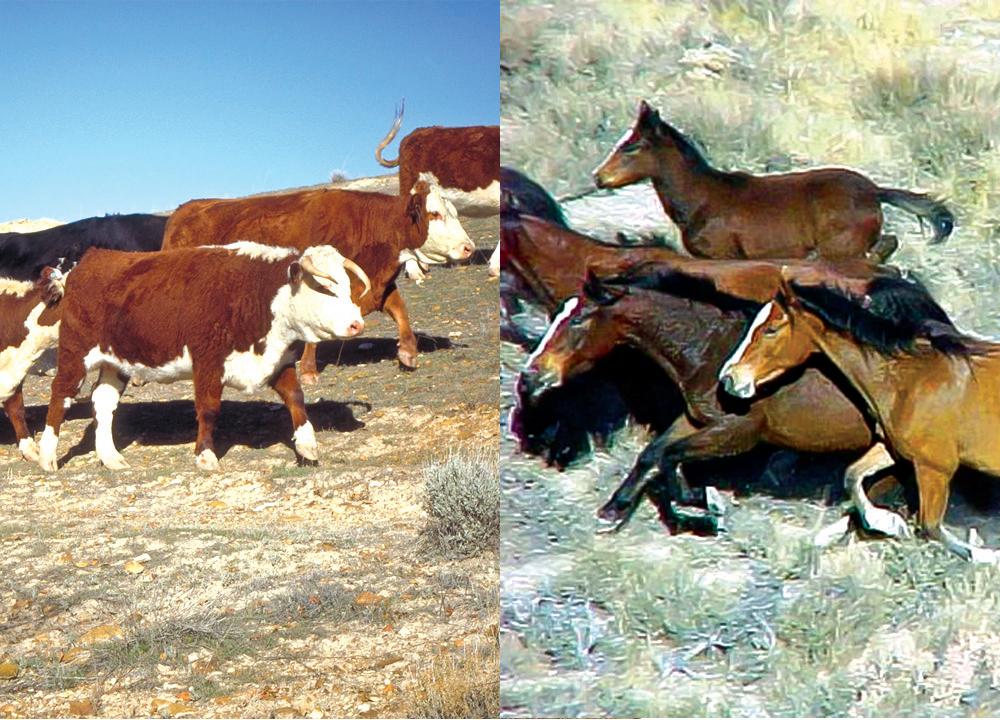
10 minute read
News
from April 17, 2014
Washoe Iraq costs pass billion
“Roy Hobbs” in the Roger Towne and Phil Dusenberry screenplay of The Natural: “I guess some mistakes you never stop paying for.”
Advertisement
Last month marked the 11th anniversary of the U.S. war on Iraq. The U.S. has supposedly extricated itself from that war, but it’s hard to tell from the ongoing payments for it. According to the National Priorities Project, which tracks finances of U.S. military adventurism, as of April 4 at 2:17 p.m., the cost to U.S. taxpayers of the Iraq war hit $818,275,977,147 and it is still rising by $365,297 an hour.
By that same date, the cost to Reno taxpayers had hit $678,648,086—that’s two and a half times the cost of the Reno railroad trench—and the counter is still running at $303 an hour.
Also by that date, the taxpayers of Washoe County had paid $1,368,322,901 for the war and that amount is rising by $612 an hour.
When we last checked these numbers, in September (“The meter’s still running,” RN&R, Sept. 12, 2013), the national figure was $814,086,482,000 and the Reno figure was $676,862,107.
Columnist slimes Reid
Some kind of line was crossed last week when Washington Post columnist Jennifer Rubin described U.S. Sen. Harry Reid of Nevada as “loathsome.”
Her April 7 column began, “There are few politicians more cavalier with the truth and more loathsome than Senate Majority Leader Harry Reid.” She then went through a litany of old and current complaints about Reid in order to defend the Koch brothers from Reid’s current campaign against the two corporate funders of right wing causes.
Rubin has often been criticized for her vitriolic language, with the Post’s reader representative calling publicly for her firing and a Post editor once tweeting a reminder that Rubin “is NOT a WaPo reporter.” In 2011 she accused the Occupy movement of anti-Semitism and was herself accused of the same thing after she wrote an article titled “Why Jews Hate Sarah Palin.”
Nuke advocate attacks Obama
In an essay for the Hill, a newspaper of congressional affairs, U.S. Rep. John Shimkus tore into President Obama for bringing the Yucca Mountain project to a halt.
“While many are aware of the administration’s legally suspect Obamacare delays and go-it-alone attitude toward immigration, climate and a host of other policies, few realize President Barack Obama has also actively subverted the 30-year-old Nuclear Waste Policy Act, the law governing the development of a safe repository for our nation’s nuclear waste, and he wants to stick taxpayers with the bill. The Nuclear Waste Policy Act states that the Nuclear Regulatory Commission ‘shall’ consider Yucca Mountain as our nation’s permanent geologic repository for high-level nuclear waste and that the commission “shall” approve or disapprove the Department of Energy’s Yucca Mountain application no less than three years after its submission. ‘Shall’ is not a suggestion.”
The Nuclear Waste Policy Act, approved in 1982, provided for a competitive scientific suitability study among sites and also provided for two dumps—one in the east and one in the west. Shimkus, a member of the House Energy Committee, neglects to mention that Congress in 1987 called a halt to that scientific process, killed the eastern dump, and eliminated all candidate sites but Nevada.
According to OpenSecrets.com, among industries, electric utility political action committees are the second biggest contributors to Shimkus. He also has his own PAC, the John S Fund, that he uses to help other House members. Electric utilities are the number one contributors to the John S Fund. Among its contributors are PACS of the Nuclear Energy Institute and the National Rural Electric Cooperative Association. Those receiving money from those groups after it has passed through Shimkus’s hands include U.S. Rep. Joe Heck of Nevada, who received a $1,000 contribution from the John S Fund.
Shimkus hails from Illinois, which contains seven nuclear power facilities, one of them closed.
Lower water, higher tension
Drought causes squeeze on water in West
by
A “Weed Extravaganza” is set for April 29-May 1 at the California Trail Interpretive Center in Elko County. Dennis Myers It’s a reflection of the fact that weeds can proliferate in drought periods, in turn creating more ground cover, in turn helping wildfires spread more rapidly, in turn making wildfires more difficult to fight. So the workshop in Elko County at the end of the month will help ranchers, farmers and others strategize on how to control weeds, particularly invasive weeds. Drought in Nevada and the West is looming larger as summer draws nearer. With water being squeezed, difficult choices must be made. Nevada’s a mining state, for instance. “Surely in times of drought, such as now exists in much of Far West, mines located in arid locations like Nevada could help supplement agricultural or municipal water needs, thus helping to foster trust between mining operators and local communities?” asked mining journalist Dorothy Kosich on Mineweb. Her answer
Dave Miller Iron County, Utah, commissioner wasn’t all that reassuring to anyone without a stake in the mining industry:
“However, dry year options aren’t an option for Nevada gold mining companies to help their neighbors in times of drought. In Nevada, one of the largest water rights holders for the Humboldt River, which flows through a considerable portion of the state’s gold mining region, is Newmont Gold. During these past two years of drought, at least one Nevada municipality has asked Newmont for water to supplement their storage water supply. However, Newmont is probably unable to accommodate that community’s needs.”
In California, Gov. Jerry Brown told his department heads to ease water transfers so commercial water can be made available to municipalities, some of which have imposed rationing. Nevada doesn’t have the laws providing for those kinds of actions.
In ranching, companies want to squeeze every drop from the land, which pits them against an emotional symbol—the wild horse. This confrontation was given a face when rancher Cliven Bundy took on the Bureau of Land Management, though not all western ranchers welcomed Bundy as their voice.
Bundy has refused to pay his grazing fees since 1993 and has asserted in court that the Bureau of Land Management has no authority over the range because his family was using it before the agency was created. The courts have consistently rejected that argument. But BLM has been reluctant to enforce the law on him until the drought started squeezing water. Without support from the law, Bundy invited supporters onto his ranch to face off with federal officials last week. His supporters, too, tried to raise the temperature of the confrontation, with headlines on their websites like “Armed Fed Agents and Snipers?” (TheBlaze.com) and “Ruby Ridge-style Standoff Brewing” (TeaPartyTribune.com).
In interviews. Bundy made it clear he would accept as legal only decisions that go in his favor. “I’ve tried to stop them for 20 years,” he told the Las Vegas Sun. “I’ve tried to be legal in the courts. I’ve tried to do it politically and through the media. Now, it’s about down to having to do it as we the people.” His grazing fee arrears are in the hundreds of thousands of dollars.
The issue became ensnared with the wild horse issue because money to remove horses from the range is limited and the feds are already under fire from wild horse advocates for some removals. The ranchers don’t want horses competing for water and graze.
County commissions in Iron County and Beaver County in Utah attacked the BLM for failing to get rid of the horses. They were particularly irate when the BLM funded operations to confiscate Bundy’s cattle in Clark County, Nevada, with estimates of that cost ranging from $1 million to $2 million.
At a meeting of the Iron County commissioners and BLM officials, the county officials ended the meeting when they heard that it might take months to remove the horses. Commissioner Dave Miller said, “We have to protect the range. We will lose the range this year with drought, the impacts of new foals. .... So let me be clear: Any plan that talks about removing those horses in multiple months is unacceptable. We have to get those horses off the range immediately.” The commissioners and Iron County Sheriff Mark Gower formally notified BLM officials last week that if the agency doesn’t remove the horses, they will. That would put county officials in the position of trying to capture about 1,700 wild horses, which could be a multi-million dollar operation.
After BLM started confiscating Bundy cattle—and did it without
Cattle and wild horses are competing for water on the Western range.
violence—U.S. Sen. Dean Heller of Nevada jumped in on Bundy’s side. In its entirety, Heller’s release read, “(Washington, D.C.) – Today, U.S. Senator Dean Heller (R-NV) issued this statement regarding land closures that the Bureau of Land Management (BLM) has initiated due to the ongoing, court-ordered roundup of rancher Cliven Bundy’s cattle: ‘I spoke with BLM Director [Neil] Kornze this morning to express great disappointment with the way that this situation is being handled. I told him very clearly that law-abiding Nevadans must not be penalized by an over-reaching BLM. After hearing from local officials and residents, and receiving feedback from the Nevada Cattlemen’s Association in a meeting this morning, I remain extremely concerned about the size of this closure and disruptions with access to roads, water and electrical infrastructure. I will continue to closely monitor this situation, and urge the BLM to make the necessary changes in order to preserve Nevadans’ constitutional rights.’ ”
It’s not clear why, but the Heller release mentioned Bundy by name only in the section normally read by reporters, but not in the section of the release containing Heller’s prepared public statement. Heller did not say how the Bundy problem should have been handled or offer any alternative plan for dealing with it.
Nevada Gov. Brian Sandoval, a former federal judge and state attorney general, also sided with Bundy.
Iron County columnist Dallas Hyland wrote that Bundy’s friends have given him bad advice. “The day he decided to stop paying his grazing allotment fees required by law, (not imaginary law, mind you, but real law passed by Congress and enforced by federal agency) he rendered his voice and any control he had over the destiny and use of the land irrelevant,” Hyland wrote.
The Salt Lake Tribune editorialized, “But just because something is public doesn’t give all, or any, members of the public the right to wander onto that land and do anything they want. Grazing cattle, rounding up wild horses, running off-road vehicles or doing other things anybody pleases—under the theory that federal land is public and open—makes no more sense than claiming that anybody who feels like it can set up a hot dog stand in the Capitol Rotunda or bed down for the night in the White House.”
A BLM statement said it was “unfair to the thousands of other ranchers who graze livestock in compliance with federal laws and regulations throughout the West” for Bundy to get away with 20 years of free grazing, and that he had resisted administrative and judicial resolutions.
Nearly everyone on both sides of the issue faults the BLM for failing to curb Bundy before two decades had passed.
The BLM eventually called off the confiscation of Bundy cattle to avoid the risk of violence. Ω
Getting ready
At the student union bookstore at the University of Nevada, Reno, a customer looks over the graduation gowns that are available. Commencement is scheduled for May 16 and 17 on the campus quad. There are now two undergrad commencements. The campus added the second spring undergrad ceremony last year because of sharp increases in the size of crowds attending, the result of increased enrollment and graduation rates.















